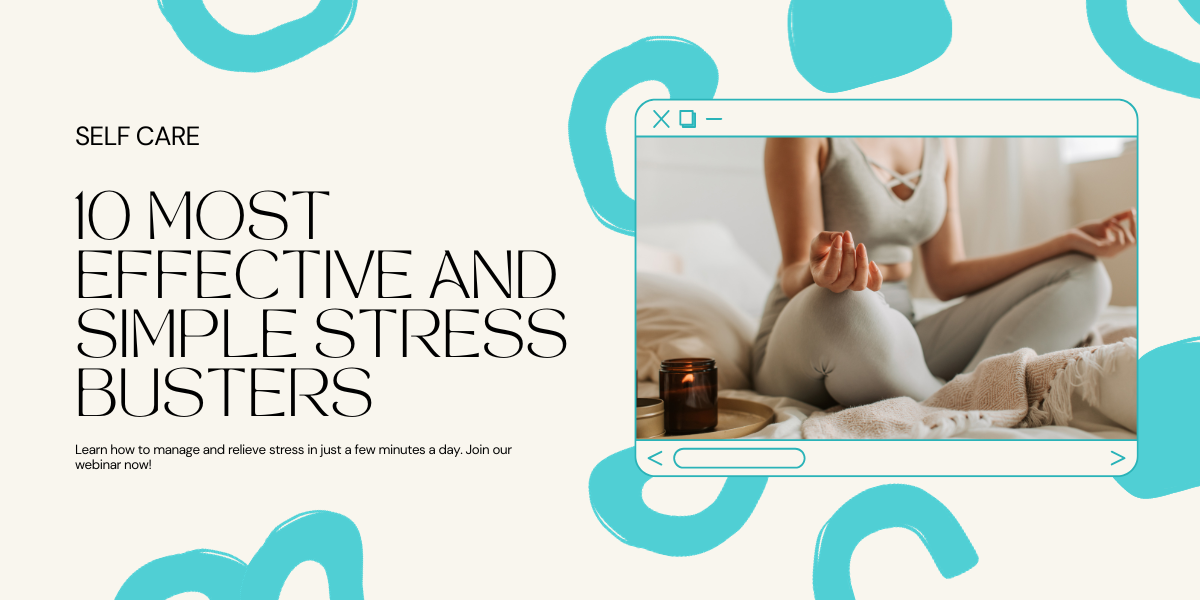10 Most Effective And Simple Stress Busters To Try Immediately

Introduction
With many versions of the pandemic that came our way, we have experienced social distancing, isolation, couple lockdowns, and a shift to online learning, and working. On the whole, we have experienced a lot of changes.
Statistics show that almost 30% of the population are experiencing stress this year, due to many such changes that came our way!

“Sometimes The Most Productive Thing You Can Do Is Relax.”
–Mark Black
When dealing with stress, there are two broad ways you can cope with it. You can either try to calm yourself or try to fix the source of the stress.
These strategies are emotion-focused and problem-focused coping mechanisms.
Both of these strategies are helpful. You can pick what works best for you.
Have a look at some of our research driven tips and tricks to beat that stress away!
Emotion-Focused Coping Strategies
1. Deep Breathing
Most of us take short breaths; the more aroused or angry we are-the shorter the breaths. Deep breathing involves breathing in and out slowly. The Benson technique suggests that you sit quietly in a comfortable position, close your eyes, and relax your muscles before you start deep breathing. You can then breathe in through your nose and breath out by counting silently to yourself. You can repeat this for about 10-20 minutes. Research shows that deep breathing decreases both self-reported and physiological stress levels.
2. Mindfulness
We all have our minds ‘full’ of something or the other. To reduce stress levels, you have to become ‘mindful’ or aware of the present moment. The simplest way of doing so is by focusing on your five senses. What are you seeing, hearing, smelling, tasting, and feeling? Many research studies have also proven that mindfulness can reduce stress. When practicing mindfulness, one must have patience, trust, determination, acceptance, and willingness to release the need to control things.
3. Music
Most of us enjoy listening to some music or the other and have our favorite songs. Research shows that listening to music helps reduce stress. So next time you feel stressed, listen to your favorite song!
4. Yoga
Yoga has many mental and physical health benefits. One of those benefits is stress management. The Journal of Evidence-Based Integrative Medicine (2013) suggests that yoga reduces stress. Studies have found that yoga decreases both cognitive and body stress. It also helps reduce work-related stress and enhances the individual’s ability to react to stress. Further, these asanas are simple to learn and practice.
5. Exercise
Stress makes our mind and body tense. Using muscle relaxation techniques can help calm your body and mind. Exercise helps combat stress by improving your physical resistance to stress and promotes the generation of new brain cells. These techniques can be very helpful in calming both your mind and body.
6. Sleeping
In recent times losing sleep for work, studies, or pleasure has become a trend. Unfortunately, scientific evidence shows that a lack of sleep leads to bodily changes. These changes make us more prone to stress. Taking a nap when you are feeling stressed can help you feel more energized and mentally relaxed. It will help you face the issue with renewed confidence.
7. Seeking Social Support
When we are in a difficult situation, we may feel that there is no solution. Sometimes it is useful to get a third person’s perspective about the same issue. Talking to a friend or family member about the situation can be an insightful experience. Research has found that social support and connectedness can help reduce stress.
8. Humor
Being humorous is seen to be a good coping mechanism. It can be helpful in two ways-directly and indirectly. Directly, a sense of humor can reduce the feeling of suffering and help you look at the situation differently. Indirectly, being humorous will help you attract more social support and you can discuss your problems with them.
Problem-Focused Coping Strategies
1. Being Assertive
Many problems arise because of miscommunication or lack of assertiveness. Sometimes we take on more work because we can’t say no! Scientific evidence shows that the ability to say no is related to mental health. Cutting down on your workload or your to-do list by saying ‘no’ can quickly reduce your stress.
2. Avoiding Procrastination
Procrastination is our tendency to say- “I’ll do that later!”. Though it may reduce our stress in the short-term, it can lead to high-stress levels later on. Instead of waiting for the last minute, manage your time well. Set a schedule to complete one task at a time.
Are You Looking For Professional Help To De-Stress?
We hope these stress management techniques have been helpful. If you feel overwhelmed by your stress and need professional support, we can help you. CareMe offers highly professional counseling services from well-trained psychologists. Set up an appointment now!
Did You Like These Stress Management Techniques?
Did you like these techniques? Do you currently use any of them?
Let us know how you deal with stress. Please share your tips for de-stressing and tell us how effective they were!
You can also refer to the self-help book provided by the WHO for more stress management tips.
Related Articles

Letting Go With Grace: Emotional Tools for Closure
Letting go is never easy. Whether we are parting ways with a loved one, ending a relationship, leaving a job, or saying goodbye to a cherished chapter of life, the emotional weight can feel overwhelming. Yet, closure is essential for our emotional well-being. Without it, we carry unresolved grief, anger, regret, or longing that can seep into new relationships and experiences, holding us back from healing and growth.

Breakup Blues: How to Cope and Rebuild Your Self-Worth
A breakup often feels like a silent earthquake—unseen by others but devastating within. The pain doesn’t just come from the loss of a relationship, but from the crumbling of the life, identity, and future you built with another person. You may find yourself questioning your worth, doubting your value, and feeling isolated even when surrounded by people. In Indian society, where emotional expression is often discouraged and breakups can be stigmatized, this pain may feel even more overwhelming. But the truth is—while breakups may shake you, they do not define you. You are not broken; you are in a process of emotional reformation. And with the right tools, guidance, and support system, you can rebuild not just your self-worth but also your entire life narrative.

Healing After Heartbreak: A Mental Health Perspective
Heartbreak doesn't just break your heart—it can shatter your sense of identity, peace, and purpose. Whether the end was expected or abrupt, mutual or one-sided, short-lived or long-term, the aftermath often leaves people emotionally disoriented. In Indian culture, where societal expectations and family involvement in romantic relationships are prevalent, the pain is not just personal—it is public. Yet, very few are taught how to heal from emotional loss in a healthy, sustainable way.

Boundaries in Love: Saying ‘No’ Without Guilt
Love, in its truest form, should be a safe space—a space where individuality is not only respected but celebrated. Yet, in many relationships, especially in the Indian cultural context, love is often misunderstood as constant availability, complete sacrifice, and putting the other person first, always. As noble as this may sound, this version of love often leads to emotional exhaustion, suppressed resentment, and the erosion of one’s identity.

Gaslighting in Relationships: What It Is and How to Heal
Gaslighting is a form of emotional abuse that erodes your ability to trust your own perception. It’s a slow, insidious process that often begins with subtle doubts and ends with complete self-questioning. In romantic relationships—especially in the Indian context where silence, compromise, and duty are often mistaken for love—gaslighting can be even harder to recognize.

When One Partner Struggles: Supporting Mental Health in Relationships
Relationships are a beautiful blend of shared experiences, emotional growth, and mutual care. But they also come with challenges—especially when one partner is struggling with their mental health. In a society like India, where mental health is still heavily stigmatized, couples often find themselves ill-equipped to handle psychological distress in their relationship.
